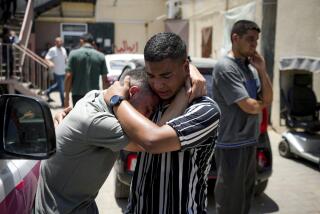Serb Rockets Hit Zagreb, Sow Terror
- Share via
ZAGREB, Croatia — War reached this European capital Tuesday as rebel Serbs bombarded the heart of Zagreb in deadly revenge for a fierce Croatian army offensive that was swiftly driving Serbs from a four-year stronghold.
The Croatian government late Tuesday said it had successfully recaptured part of the land seized by rebel Serb separatists in their 1991 war of secession.
But earlier, Serb rocket attacks on the capital killed five people, wounded 120 and sowed terror in a city that had believed itself safe.
Labeling the attacks on Zagreb “savage,” U.S. Ambassador to Croatia Peter Galbraith said the midday assault, with missile-delivered cluster bombs, amounted to “a declaration of full-scale war.”
He ordered families of U.S. Embassy officers to abandon the country and arranged escorts for U.S. citizens, who were also being urged to leave. He warned again of a wider, quickly escalating Balkan war, even as Clinton Administration officials in Washington denounced the Croatian offensive and called on both sides to halt the combat.
On the second day of the heaviest fighting in Croatia since the 1991 war left 10,000 dead, Croatian MIG jets again struck at a bridge connecting Croatian Serb territory with potential reinforcements in Bosnia-Herzegovina.
Battles were reported around and in the town of Okucani, a Croatian Serb headquarters, through much of the morning. Croatian troops took control of the region at midday, U.N. observers said.
With the seizure of that ground, the Croatian army seemed to have achieved its goal of wresting control of a transnational highway blocked by the Serbs and of ejecting them from a U.N.-protected enclave established under 1992 peace accords.
The area is known as Western Slavonia, and most of the fighting was centered 60 to 70 miles southeast of Zagreb.
“Croatian Serb forces stopped giving organized resistance,” a statement from President Franjo Tudjman’s office said.
No reliable information on casualties in the countryside was available. But U.N. and European Union observers expected them to be high.
More than 5,000 Serb refugees, walking and on tractors, were fleeing south to Bosnia, the United Nations said.
But in Zagreb, the psychological damage may even outlast the considerable physical damage from Tuesday’s rocket attacks.
One of at least five shrapnel-loaded missiles hit about a block from the U.S. Embassy in the center of Zagreb, where personnel scampered to bomb shelters. The attack heavily damaged a police headquarters and shattered and torched cars for more than a block.
Three people were killed at the site, city officials said.
Galbraith said his security people later picked up fragments of cluster bombs--the rocket-delivered devices he described as designed exclusively to kill people.
Another missile blasted a schoolyard, and several explosions were reported near the airport, where commercial traffic was temporarily halted. Two young girls and a teacher were seriously wounded at the school, Croatian news reports said.
The blasts in Zagreb underscored in swift, dramatic fashion the fears that the war will escalate. It panicked and stunned a population that has believed it lived in an oasis amid war.
Zagreb--an elegant city of tree-lined promenades and tulip-filled parks that likes to think of itself as more European than Balkan--always managed to maintain a comfortable distance from fighting in the earlier conflicts.
With the exception of minor shelling in 1991 and 1993, the city has not seen the bloodshed that has bathed the rest of the former Yugoslav federation.
So Tuesday’s attack struck at Zagreb’s sense of self-confidence and security, sounding a deep chord of paranoia and fear unknown for many capital residents until now.
“If this happens in Zagreb, then anything can happen,” said waitress Milka Korza, her eyes red-rimmed from weeping as she watched the day’s television news reports.
Branko Horvat, a deliveryman for a chemical company who was driving into the downtown Strossmayera Square near the U.S. Embassy just as the explosions rang out, observed: “I feel right now like putting on a uniform and going to the front line--I am that angry.
“This is going to happen more and more now because they are that kind of people,” added Horvat, 33. His hands trembled as he nervously smoked a cigarette, even though gasoline was pouring out of the back of his lightly damaged car.
Across Zagreb on Tuesday, air raid sirens sounded, hospitals filled with bleeding and cut citizens, frantic police rerouted traffic from downtown, and schools were ordered closed for two days.
U.N. officials have warned that the Croatian Serbs are still in a position to hit targets in Croatia, and there is a possibility their Bosnian Serb allies will join the combat.
In Bosnia, angry that U.N. troops did not stop the Croatians, Bosnian Serb leader Radovan Karadzic accused Zagreb of “impudent aggression” and added: “No one can stop us from taking up arms to defend our people.”
* ON THE FRONT LINE: After recapturing land, Croatians voice jubilation, fears. A8
More to Read
Sign up for Essential California
The most important California stories and recommendations in your inbox every morning.
You may occasionally receive promotional content from the Los Angeles Times.














